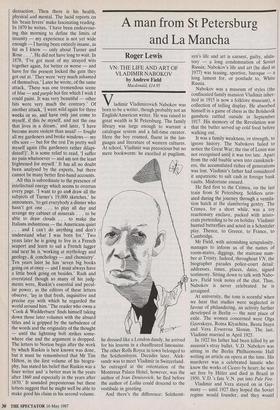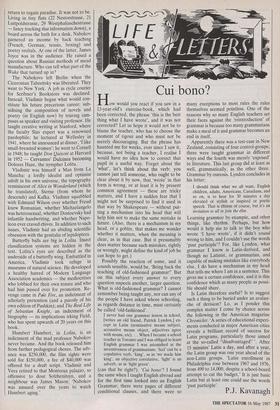A man from St Petersburg and La Mancha
Roger Lewis
VN: THE LIFE AND ART OF VLADIMIR NABOKOV by Andrew Field
Macdonald, £14.95
Vladimir Vladimirovich Nabokov was born to be a writer, though probably not an English/American writer. He was raised to great wealth in St Petersburg. The family library was large enough to warrant a catalogue system and a full-time curator. Here the boy roamed, fluent in the lan- guages and literature of western cultures. At school, Vladimir was precocious- but no mere bookworm: he excelled at pugilism, he dressed like a London dandy, he arrived for his lessons in a chauffeured limousine. The other Rolls Royce in town belonged to the Solzhenitsyns. Decades later, Alek- sandr was to meet Vladimir in Switzerland. So outraged at the ostentation of the Montreux Palace Hotel, however, was the author of Ivan Denisovich, he fled before the author of Lolita could descend to the vestibule in greeting.
And there's the difference: Solzhenit- syn's life and art is earnest, guilty, ulula- tory — a long condemnation of Soviet Russia; Nabokov's life and art (he died in 1977) was teasing, sportive, baroque — a long lament for, or postlude to, White Russia.
Nabokov was a museum of styles (the confiscated family mansion Vladimir inher- ited in 1915 is now a folklore museum), a collection of telling display. He absorbed himself in a game of chess as the Bolshevik gunshots rattled outside in September 1917. His memory of the Revolution was that the butler served up cold food before walking out.
It was a family weakness, or strength, to ignore history. The Nabokovs failed to notice the Great War; the rise of Lenin was not recognised until it was too late. Apart from the odd bauble sewn into camiknick- ers, the accumulated riches of generations was lost. Vladimir's father had considered it unpatriotic to salt cash in foreign bank vaults. Misfortune ensued.
He fled first to the Crimea, on the last train from St Petersburg. Soldiers urin- ated during the journey through a ventila- tion hatch at the slumbering gentry. The Crimea, for a short while; was a toy reactionary enclave, packed with aristo- crats pretending to be on holiday. Vladimir hunted butterflies and acted in a Schnitzler play. Thence, to Greece, to France, to Cambridge.
Mr Field, with astonishing scrupulosity, manages to inform us of the names of room-mates, diggings, the staircase num- ber at Trinity. Indeed, throughout VN, the biographer parades police-court detail: addresses, times, places, dates, signed testimony. Sitting down to talk with Nabo- kov, Field took notes of the chat. Thus, Nabokov is never celebrated: he is arraigned.
At university, the tone is scornful when we hear that studies were neglected in favour of philandering, an activity further developed in Berlin — the next place of exile. The women concerned were Olga Grovskaya, Roma Klyachina, Beata Inaya and Vera Evseevna Slonim. The last, Vladimir married in April 1925.
In 1922 his father had been killed by an assassin's stray bullet. V.D. Nabokov was sitting in the Berlin Philharmonic Hall writing an article on opera at the time. His murderer was a celebrated lunatic who knew the works of Cicero by heart; he was set free by Hitler and died in Brazil in 1950. V.D.'s fate V.N. put into Pale Fire.
Vladimir and Vera stayed on in Ger- many — until 1927 they hoped the Soviet regime would founder, and they would return to regain paradise. It was not to be. Living in tiny flats (22 Nestorstrasse, 21 Luitpoldstrasse, 29 Westphaliaschestrasse — fancy tracking that information down), a board across the bath for a desk, Nabokov garnered an income by hack teaching (French, German, tennis, boxing) and poetry recitals. At one of the latter, James Joyce was in the audience. He raised a question about Russian methods of mead manufacture. Who can tell what part of the Wake that turned up in?
The Nabokovs left Berlin when the Ciceronian Taboritsky was liberated. They went to New York. A job as cycle courier for Scribner's Bookstore was declined. Instead, Vladimir began what would con- stitute his future precarious career: sub- sidising the composition of novels and poetry (in English now) by touring cam- puses as speaker and visiting professor. He taught creative writing at Stanford, where the faculty Slav expert was a renowned paedophile; he lectured at Wellesley in 1941, where he announced at dinner, 'I like small-breasted women'; he went to Cornell in 1948; he taught Don Quixote at Harvard in 1952 — Cervantes' Dulcinea becoming Dolores Haze, the nymphet Lolita. Vladimir was himself a Man from La Mancha: a lordly idealist and optimist adrift in his own universe, the topography reminiscent of Alice in Wonderland (which he translated), Sterne (from whom he descends) and Kafka. Vladimir squabbled with Edmund Wilson over whether Freud knew Romanian, whether Michaelangelo was heterosexual, whether Dostoevsky had infantile handwriting, and whether Napo- leon ever craved chives. In addition to such issues, Vladimir had an abiding scientific obsession with the. genitalia of lepidoptera.
Butterfly balls are big in Lolita. Insect classification systems are hidden in the text. Lolita's eyes are described as the underside of a butterfly wing. Embattled in America, Vladimir took refuge in museums of natural science. He developed a healthy hatred of Modern Language Association academics — the mediocrities who lobbied for their own tenure and who had him passed over for promotion. Re- venge came in Pale Fire, an indictment of scholarly pretention (and a parody of his own edition of Pushkin); and The Real Life of Sebastian Knight, an indictment of biography — its implications irking Field, who has spent upwards of 20 years on this book.
Humbert Humbert, in Lolita, is an indictment of the mad professor Nabokov never became. And the book released him from further pedagogical chores. The adv- ance was $250,000, the film rights were sold for $150,000, a fee of $40,000 was offered for a draft script. Vladimir and Vera retired to that Montreux palazzo, so offensive to dour Solzhenitsyn, and a neighbour was James Mason: `Nabokov was amused over the years to watch Humbert aging.'





















































 Previous page
Previous page